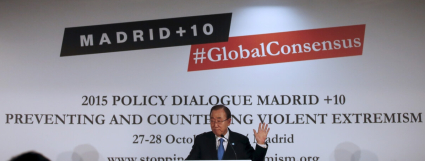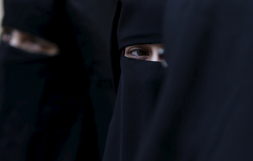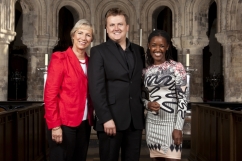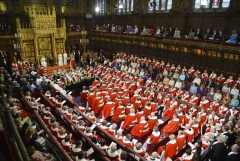Britons "benefit a great deal" from Sharia law, the home secretary said as she launched an inquiry into the use of Islamic courts in the UK.
The independent investigation comes after allegations that dozens of Sharia courts are run as a sub-section of British law and often discriminate against women and girls in devout Islamic communities.
But Theresa May said the investigation would focus on whether Sharia ideas were being "misused or exploited" to target women, not whether the various schools of Sharia law discriminate against women in their teaching.
In a statement to announce the review, home office minister Lord Ahmed of Wimbledon said: "It will not be a review of the totality of Sharia law, which is a source of guidance for many Muslims in the UK."
May added that many British people of different faiths "follow religious codes and practices, and benefit a great deal from the guidance they offer". She went on to say it was a "significant concern" that a number of women have reportedly been victims of discrimination by Sharia courts.
Professor Mona Siddiqui will chair the review, which the government said would examine whether British law is broken by Sharia courts. "There is only one rule of law in our country, which provides rights and security for every citizen," said May.
However Andrea Williams, chief executive of the conservative evangelical group Christian Concern said the inquiry was "flawed from the start". She said the answers to the inquiry's questions were already known.
"We already know that these councils discriminate against women," said Williams. "It is well known that Sharia law is discriminatory and illiberal." Williams added it was "extraordinary" the government wanted to question whether Sharia courts were incompatible with British law.
"Women have suffered for too long from the workings of these councils. It is time for the government to put a stop to them," she said.
Sharia courts have no official place in British law but the Arbitration Act allows for legally recognised tribunals to resolve community conflicts. However, according to Baroness Cox, an independent peer who has investigated such courts, a much larger network of courts exist, often based within mosques. She said the government had not understood the urgency of tackling discrimination.
"I think the Government may well say 'let's wait until the results of the investigation' but we need action now," she told The Telegraph.
"My reservation is that it won't get to the root of the problem...a lot of Muslim women I know say that the men in their communities just laugh at this proposed investigation, that they will go underground, so the investigation will have to be very robust."
She went on to say May was wrong that discrimination was only the result of "distortion" of Sharia law. Cox argued there were inherent aspects to Sharia law which were "unacceptable".
"I believe in freedom of religion and I believe that there are aspects of Sharia law that are totally unproblematic," she said.
"If Muslims want to fast, well Christians do that at Lent; if they want to pray five times a day, that's more than I do.
"But the aspects which are causing such concerns – such as that a man can divorce his wife by saying 'I divorce you' three times – that is inherent; the right to 'chastise' women is inherent; polygamy is inherent. I don't think those things are a distortion of Sharia law.
"These are aspects of Sharia law which are unacceptable."
The Muslim Council of Britain questioned why Islam was being singled out for investigation.
In a statement, the group said: "There needs to be firm evidence to justify the focus on one particular faith group for investigation.
"Thus far, there has been much heat but little light shed on Sharia councils, much of it generated through rumours or one-off incidents promoted by ideologically-driven and misinformed journalists or politicians.
"In today's society we do not believe that broad-brushed accusations targeting a specific community without the relevant evidence bodes well in our common goal of a more cohesive society."

















